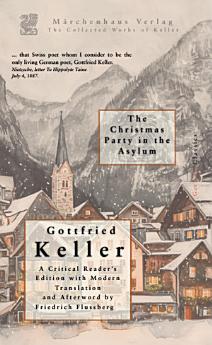The Christmas Party in the Asylum
May 2024 · Marchen Press
Ebook
47
Pages
family_home
Eligible
info
reportRatings and reviews aren’t verified Learn More
About this ebook
This was Dr. Gottfried Keller's address of appreciation for Professor Dr. Hitzig at Burghölzli at a Christmas party as he was appointed director of the Burghölzli asylum. Eduard Hitzig studied at Friedrich-Wilhelms University in Berlin and Julius-Maximilians University in Würzburg, learning from notable figures like Emil Du Bois-Reymond, Rudolf Virchow, Moritz Heinrich Romberg, and Carl Friedrich Otto Westphal. He was a member of the Nassovia Würzburg Corps (1859) and the Neoborussia Berlin Corps (1860). He earned his medical doctorate in 1862 and started his medical career as an electrotherapist in Berlin. In 1872, he became qualified in internal medicine and psychiatry through habilitation in Berlin. By 1875, Hitzig became the director of the Burghölzli mental institution and a full professor of psychiatry at the University of Zurich. In 1879, he was appointed as the director of the Neuropsychiatric Clinic and a professor of psychiatry at the University of Halle, where he opened Prussia's first independent psychiatric and nerve clinic in 1891. The narrative emphasizes the serene and respectful demeanor of the patients, illustrating a collective consciousness that maintains order and decorum. The highlight of the event includes poetic performances by staff members dressed as the four seasons, and a humorous appearance by a doctor disguised as "Old Winter," bringing laughter and light-heartedness to the assembly. He also reflects on the significance of such celebrations in the context of mental health care, praising the institution's ability to create a harmonious environment despite the challenges. It underscores the evolution of societal attitudes towards mental illness, moving from neglect and stigma to a more humane and scientific approach. The account concludes with a hopeful note, expressing gratitude for the efforts of the staff and the positive impact of the celebration on the patients. This modern critical reader's translation from the original German includes supplementary materials that bring Keller's life and impact to life. Nietzsche considered Keller to be one of the greatest living poets of his time. However, his works are rarely found in other languages, so most people today are unaware of who he was or why he was important. This edition remedies that situation by providing a clear, accessible version of Keller's original German writing and offering insight into his broader ideas and the philosophical landscape in which he operated. Working directly from Keller's manuscripts, this new translation delivers literary excellence and scholarly depth with amplifying materials. Readers will discover not only Keller's powerful voice but also the philosophical currents that shaped an entire era of German thought. The edition includes an illuminating afterword tracing Keller's intellectual relationship with Nietzsche, revealing the fascinating dialogue between two of the period's most influential minds. A comprehensive timeline connects the major events of Keller's life with his published works, and a detailed index provides an authoritative guide to his complete writings. Together, these materials provide newcomers and serious readers with everything needed to appreciate one of literature's most overlooked figures.
About the author
One of Nietzsche's favorite living poets (the only real Swiss poet in his opinion, Keller was a major Swiss poet and writer, Keller is best known for his novel "Green Henry" (German: "Der grüne Heinrich"). His work is representative of the Realist movement, which sought to depict life and society as they were. Keller's stories often reflect the conflict between individual creative drives and the constraints of society. His novel "The People of Seldwyla" was one of Nietzsche's favorite.
Rate this ebook
Tell us what you think.
Reading information
Smartphones and tablets
Install the Google Play Books app for Android and iPad/iPhone. It syncs automatically with your account and allows you to read online or offline wherever you are.
Laptops and computers
You can listen to audiobooks purchased on Google Play using your computer's web browser.
eReaders and other devices
To read on e-ink devices like Kobo eReaders, you'll need to download a file and transfer it to your device. Follow the detailed Help Center instructions to transfer the files to supported eReaders.






